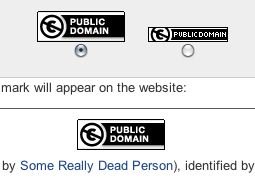Creative Commons Introduces New Public Domain Mark
![]() Yesterday Creative Commons launched a new tool, a Public Domain Mark, aimed at letting users publicly identify works that they have determined to be in the public domain.
Yesterday Creative Commons launched a new tool, a Public Domain Mark, aimed at letting users publicly identify works that they have determined to be in the public domain.
The mark expands their ongoing efforts in dealing with works without copyright. Previously, they introduced CC0, a public domain dedication system that let users waive rights to their own work (as far as possible under the law).
Users who are interested in taking advantage of the work can fill out the form to create the mark. Unlike regular Creative Commons licenses, the work is not licensed under the terms but rather is identified as being in the public domain. This means that the Mark contains information about both the person who created the work and the person who identified it as being in the public domain.
Here’s an example of the mark (Note: Obviously, this work is not in the public domain, but rather, is under the usual CC license, as such, I stripped the meta information and left in the visual content, slightly reformatted.):
 This work (This is a Test, by Some Really Dead Person), identified by Jonathan Bailey, is free of known copyright restrictions.
This work (This is a Test, by Some Really Dead Person), identified by Jonathan Bailey, is free of known copyright restrictions.
The mark does have a few limitations. For one it is not for works that are in the public domain in some jurisdictions but not others. Also, the mark is not for works where the author placed the work into the public domain by the rightsholder. Rather, this mark is solely for works that have lapsed into the public domain naturally, meaning it is almost exclusively for very old works.
Despite the limitations, the mark does have its first major user, Europeana, Europe’s public digital library/archive, which has adopted it for works in its archive that it has affirmed to be in the public domain, which will include millions of works in its database.
The next phase for the Creative Commons Organization on the public domain front is creating means to mark works as being in the public domain in certain jurisdictions but not others, which would enable users to mark a wider variety of content.
Want to Reuse or Republish this Content?
If you want to feature this article in your site, classroom or elsewhere, just let us know! We usually grant permission within 24 hours.
